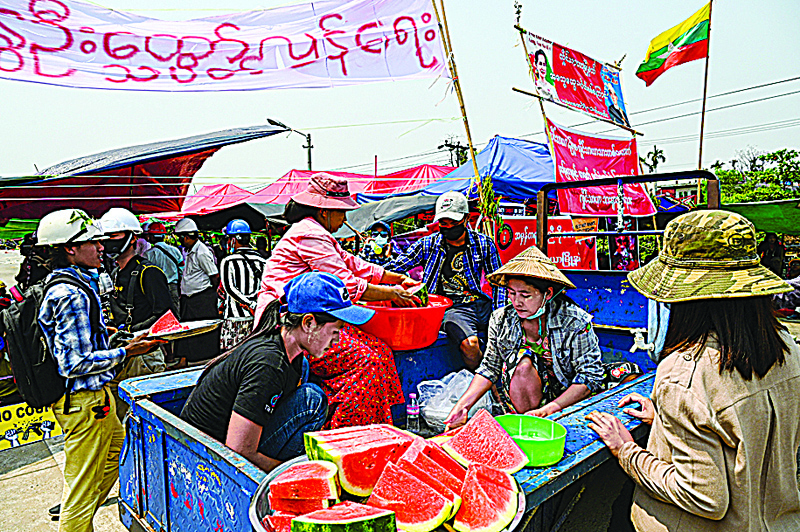 YANGON: People donate watermelons to protesters as they prepare to take part in a demonstration against the military coup in Yangon. - AFP
YANGON: People donate watermelons to protesters as they prepare to take part in a demonstration against the military coup in Yangon. - AFPROME: The political unrest in Myanmar is driving up food and fuel prices, risking pushing the country's most vulnerable people further into poverty, the UN's World Food Program warned yesterday. The price of palm oil is up 20 percent in the areas around the biggest city, Yangon, compared to the start of February, when the military ousted and detained civilian leader Aung San Suu Kyi, sparking mass protests. Rice prices in the peri-urban areas of Yangon and the second largest city, Mandalay, were meanwhile up four percent since the last week of February, the WFP said.
Across the whole country, the price of rice-a food staple-rose by three percent between mid-January and mid-February, while in a few areas prices soared by between 20 and 35 percent. The price of pulses rose by 15 percent between January and February in northern Rakhine's Maungdaw township. "These initial signs are troubling, especially for the most vulnerable people who were already living meal-to-meal," said WFP Myanmar country director Stephen Anderson.
"Coming on top of the COVID-19 pandemic, if these price trends continue they will severely undermine the ability of the poorest and most vulnerable to put enough food on the family table." The average retail price of cooking oil rose by 27 percent across northern Rakhine between January and February, and by 11 percent in central Rakhine state.
The cost of fuel nationwide has risen by 15 percent since February 1, with even steeper hikes in northern Rakhine, "raising concerns about further food price hikes", the WFP said. The WFP said it was building up a contingency food stock as part of its efforts to support more than 360,000 people in Myanmar, mostly those who are internally displaced and living in camps.
"WFP reiterates the call of the United Nations secretary-general for the will of the Myanmar people expressed in recent elections to be respected," said Anderson. "At WFP we know all too well how hunger can quickly follow when peace and dialogue are sidelined." - AFP










